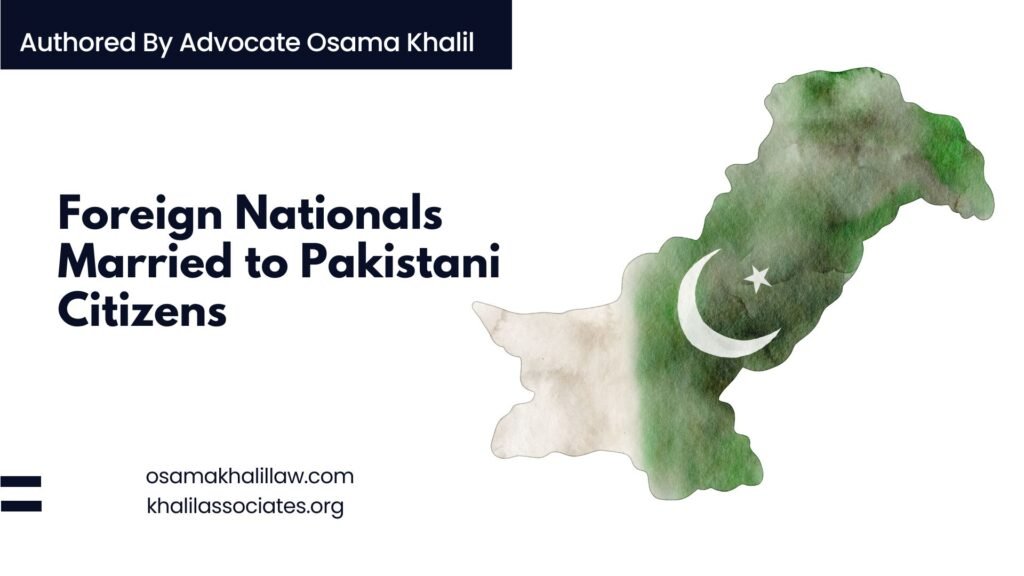
The judgment in PLD 2024 Balochistan 33 revolves around two petitioners, Masooma and Hajra, who were born in Pakistan but originally belonged to Afghan descent. Both women married Pakistani citizens and applied for Computerized National Identity Cards (CNICs). However, their requests were denied by NADRA (National Database and Registration Authority).
The petitioners then approached the Balochistan High Court under Article 199 of the Constitution, seeking a writ of mandamus to compel NADRA to issue their CNICs. The court examined the case under the Pakistan Citizenship Act, 1951, particularly focusing on Section 10(2), which deals with the citizenship rights of foreign women married to Pakistani men.
Key Legal Provisions Discussed in the Judgment
The court heavily relied on Section 10(2) of the Pakistan Citizenship Act, 1951, which states that a foreign woman married to a Pakistani citizen can apply for citizenship. However, she must first obtain a certificate of domicile from the Federal Government and take an oath of allegiance.
Additionally, Section 17 of the Pakistan Citizenship Act explains the process for obtaining a domicile certificate. The Federal Government can grant this certificate if the applicant has resided in Pakistan for at least one year before applying.
Why Were the Petitioners Denied CNIC?
NADRA refused to issue CNICs to Masooma and Hajra because they did not possess a domicile certificate. The court agreed with NADRA’s stance, stating that without this certificate, NADRA had no legal authority to issue CNICs to foreign nationals.
However, the court acknowledged the hardship faced by the petitioners. Being without a CNIC in Pakistan creates numerous difficulties, including problems in accessing healthcare, education, and legal rights. Despite this, the court could not bypass the legal requirements set by the Pakistan Citizenship Act.
Gender Disparity in Citizenship Laws
One critical observation in the judgment was the gender bias in Section 10(2). The law allows foreign women married to Pakistani men to obtain citizenship but does not provide the same right to foreign men married to Pakistani women.
The court referenced a 2008 Federal Shariat Court ruling that declared this provision discriminatory under Articles 2-A and 25 of the Constitution, as well as Islamic principles of equality. However, since the law remains unchanged, the court could only direct the petitioners to follow the existing legal procedure.
What Should Foreign Spouses Do to Obtain Pakistani Citizenship?
The court disposed of the petitions with clear instructions:
Apply for a Domicile Certificate – The petitioners must approach the Federal Government under Section 17 of the Pakistan Citizenship Act.
Submit Required Documents – This includes proof of marriage, husband’s citizenship documents, and evidence of residence in Pakistan.
Take the Oath of Allegiance – After obtaining the domicile certificate, the petitioner must take an oath before applying for citizenship.
Register with NADRA – Once citizenship is approved, they can apply for a CNIC.
Why This Judgment Matters for Foreign Nationals in Pakistan
This case sets a precedent for foreign spouses, particularly Afghan refugees, who face difficulties in obtaining legal status in Pakistan. The judgment clarifies that:
Marriage to a Pakistani citizen does not automatically grant citizenship.
A domicile certificate is mandatory before applying for a CNIC.
The current law favors foreign wives over foreign husbands, creating inequality.
Conclusion: What’s Next for Foreign Spouses Seeking Citizenship?
The PLD 2024 Balochistan 33 judgment highlights the legal hurdles foreign nationals face in Pakistan. While the court recognized the petitioners’ struggles, it emphasized that only the Federal Government can grant domicile certificates.
For foreign spouses, the key takeaway is to follow the legal process under the Pakistan Citizenship Act. Meanwhile, lawmakers should address the gender disparity in citizenship laws to ensure equal rights for all foreign spouses.
This case serves as an important reference for similar future petitions, ensuring that foreign nationals understand their rights and the steps needed to obtain Pakistani citizenship.
Final Thoughts
The Pakistan Citizenship Act plays a crucial role in determining the legal status of foreign nationals married to Pakistanis. The PLD 2024 Balochistan 33 judgment reinforces the need for proper documentation while also calling attention to unfair gender-based provisions.
If you or someone you know is in a similar situation, consult a legal expert to navigate the citizenship application process correctly. Understanding the law is the first step toward securing your rights in Pakistan.
Legal Assistance
For professional legal guidance and support in immigration matters, you may contact:
Mr. Osama Khalil
Lawyer & Legal Consultant
📞 Phone: 0316-1829946
📧 Email: contact@osamakhalillaw.com | contact@khalilassociates.org
